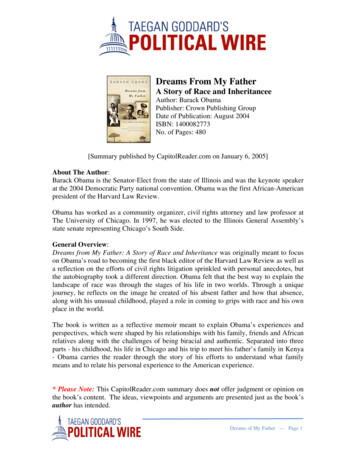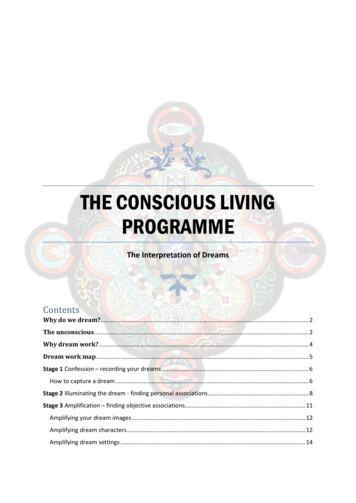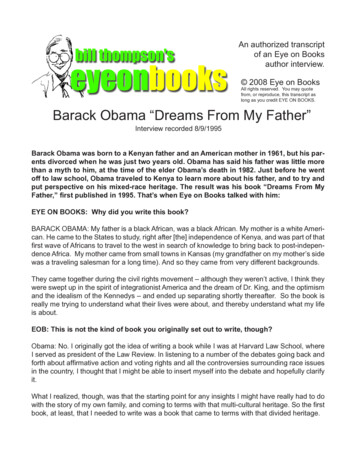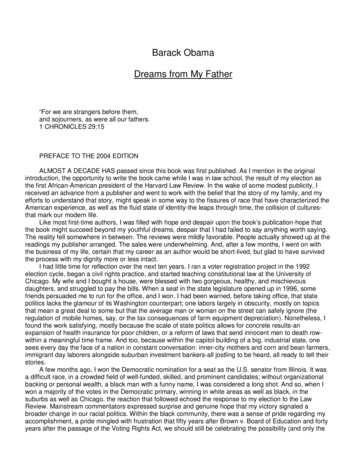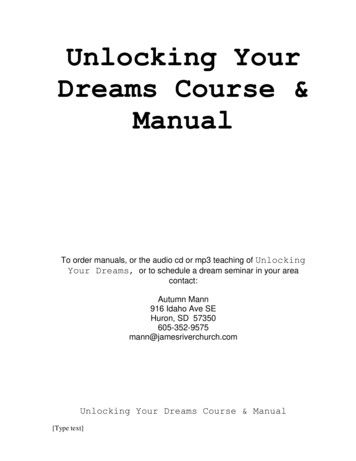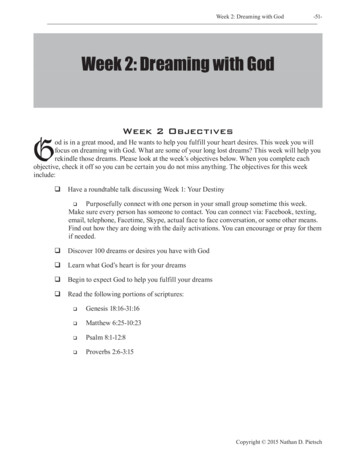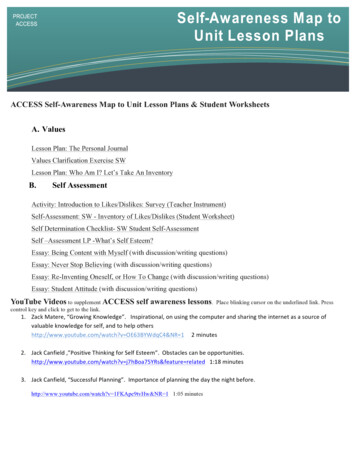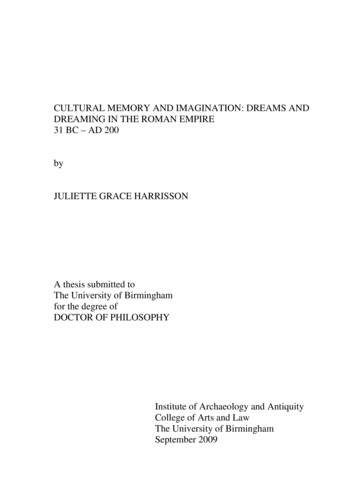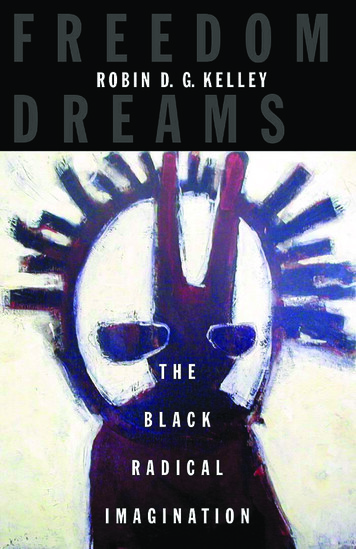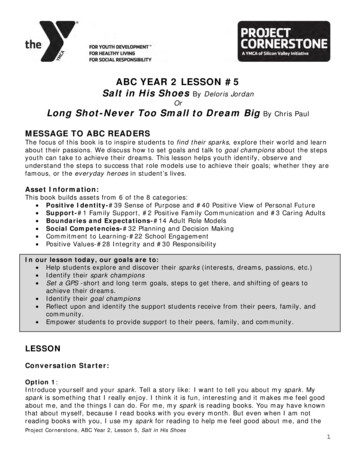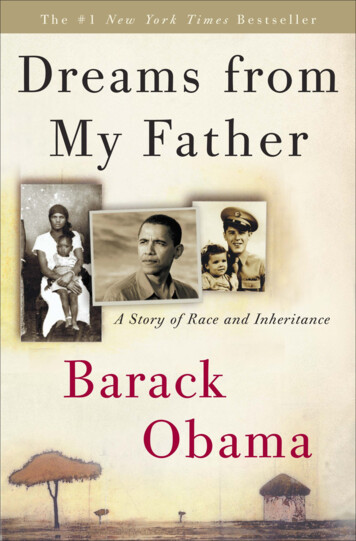
Transcription
Obam 1400082773 1p all r5.qxp11/6/062:40 PMPage iDreams from My Father
Obam 1400082773 1p all r5.qxp11/6/062:40 PMPage iiAlso by Barack ObamaThe Audacity of Hope
Obam 1400082773 1p all r5.qxp11/6/062:40 PMPage iiiDreams from My FatherA Story of Race and InheritanceBarack ObamaC RO W N P U B L I S H E R SN E W YO R K
Obam 9780307383419 1p all r8.qxp1/23/0911:41 AMPage ivCopyright 1995, 2004 by Barack ObamaPublished in the United States by Crown Publishers, an imprint of the CrownPublishing Group, a division of Random House, Inc., New York.www.crownpublishing.comCrown is a trademark and the Crown colophon is a registered trademark ofRandom House, Inc.Originally published in hardcover in 1995 by Times Books, an imprint of theCrown Publishing Group, a division of Random House, Inc. and in paperbackby Kodansha America, Inc., in 1996. Subsequently published in paperback withpreface and keynote address in 2004 by Three Rivers Press, an imprint of theCrown Publishing Group, a division of Random House, Inc. This editionappears without keynote address.Grateful acknowledgment is made to Russell & Volkening as agents for NtozakeShange for permission to reprint an excerpt from For Colored Girls Who HaveConsidered Suicide When the Rainbow Is Enuf by Ntozake Shange, copyright 1975,renewed 2003 by Ntozake Shange.Pictured in left-hand photograph on cover: Habiba Akumu Hussein and BarackObama Sr. (President Obama’s paternal grandmother and his father as a young boy).Pictured in right-hand photograph on cover: Stanley Dunham and Ann Dunham(President Obama’s maternal grandfather and his mother as a young girl).Printed in the United States of AmericaLibrary of Congress Cataloging-in-Publication DataObama, Barack.Dreams from my father : a story of race and inheritance /Barack Obama.1. Obama, Barack. 2. African Americans—Biography. 3. Racially mixed people—United States—Biography. 4. Racism—United States. 5. United States—Racerelations. I. Title.E185.97.023A3 2004973'.0405967625013'092—dc222004012412ISBN 978–0–307–38341–914151617181920First Editionwww.CrownPublishing.com
To purchase a copy ofDreams from My Fathervisit one of these online retailers:AmazonBarnes & NobleBordersIndieBoundPowell’s BooksRandom Housewww.CrownPublishing.com
Obam 9780307383419 1p all r7.qxp12/11/083:12 PMPage vFor we are strangers before thee,and sojourners, as were all our fathers.1 CHRONICLES 29:15www.CrownPublishing.com
Obam 1400082773 1p all r5.qxp11/6/062:40 PMPage viiP R E FA C E T O T H E 2 0 0 4 E D I T I O NAl m o s t a d e c a d e h a s passed since this book was first published. As I mention in the original introduction, the opportunity to write the book came while I was in law school, the result ofmy election as the first African-American president of the HarvardLaw Review. In the wake of some modest publicity, I received anadvance from a publisher and went to work with the belief that thestory of my family, and my efforts to understand that story, mightspeak in some way to the fissures of race that have characterized theAmerican experience, as well as the fluid state of identity—the leapsthrough time, the collision of cultures—that mark our modern life.Like most first-time authors, I was filled with hope and despairupon the book’s publication—hope that the book might succeedbeyond my youthful dreams, despair that I had failed to say anythingworth saying. The reality fell somewhere in between. The reviewswere mildly favorable. People actually showed up at the readings mypublisher arranged. The sales were underwhelming. And, after a fewmonths, I went on with the business of my life, certain that my careeras an author would be short-lived, but glad to have survived theprocess with my dignity more or less intact.viiwww.CrownPublishing.com
Obam 1400082773 1p all r5.qxpviii11/6/062:40 PMPage viiiP R E FA C E T O T H E 2004 E D I T I O NI had little time for reflection over the next ten years. I ran a voterregistration project in the 1992 election cycle, began a civil rightspractice, and started teaching constitutional law at the University ofChicago. My wife and I bought a house, were blessed with two gorgeous, healthy, and mischievous daughters, and struggled to pay thebills. When a seat in the state legislature opened up in 1996, somefriends persuaded me to run for the office, and I won. I had beenwarned, before taking office, that state politics lacks the glamour ofits Washington counterpart; one labors largely in obscurity, mostlyon topics that mean a great deal to some but that the average man orwoman on the street can safely ignore (the regulation of mobilehomes, say, or the tax consequences of farm equipment depreciation).Nonetheless, I found the work satisfying, mostly because the scale ofstate politics allows for concrete results—an expansion of healthinsurance for poor children, or a reform of laws that send innocentmen to death row—within a meaningful time frame. And too,because within the capitol building of a big, industrial state, one seesevery day the face of a nation in constant conversation: inner-citymothers and corn and bean farmers, immigrant day laborers alongside suburban investment bankers—all jostling to be heard, all readyto tell their stories.A few months ago, I won the Democratic nomination for a seat asthe U.S. senator from Illinois. It was a difficult race, in a crowdedfield of well-funded, skilled, and prominent candidates; withoutorganizational backing or personal wealth, a black man with a funnyname, I was considered a long shot. And so, when I won a majorityof the votes in the Democratic primary, winning in white areas aswell as black, in the suburbs as well as Chicago, the reaction that followed echoed the response to my election to the Law Review. Mainstream commentators expressed surprise and genuine hope that myvictory signaled a broader change in our racial politics. Within theblack community, there was a sense of pride regarding my accom-www.CrownPublishing.com
Obam 1400082773 1p all r5.qxp11/6/062:40 PMPage ixP R E FA C E T O T H E 2004 E D I T I O Nixplishment, a pride mingled with frustration that fifty years afterBrown v. Board of Education and forty years after the passage of theVoting Rights Act, we should still be celebrating the possibility (andonly the possibility, for I have a tough general election coming up)that I might be the sole African American—and only the third sinceReconstruction—to serve in the Senate. My family, friends, and Iwere mildly bewildered by the attention, and constantly aware of thegulf between the hard sheen of media reports and the messy, mundane realities of life as it is truly lived.Just as that spate of publicity prompted my publisher’s interest adecade ago, so has this fresh round of news clippings encouraged thebook’s re-publication. For the first time in many years, I’ve pulled outa copy and read a few chapters to see how much my voice may havechanged over time. I confess to wincing every so often at a poorly chosen word, a mangled sentence, an expression of emotion that seemsindulgent or overly practiced. I have the urge to cut the book by fiftypages or so, possessed as I am with a keener appreciation for brevity.I cannot honestly say, however, that the voice in this book is notmine—that I would tell the story much differently today than I did tenyears ago, even if certain passages have proven to be inconvenientpolitically, the grist for pundit commentary and opposition research.What has changed, of course, dramatically, decisively, is the context in which the book might now be read. I began writing against abackdrop of Silicon Valley and a booming stock market; the collapseof the Berlin Wall; Mandela—in slow, sturdy steps—emerging fromprison to lead a country; the signing of peace accords in Oslo.Domestically, our cultural debates—around guns and abortion andrap lyrics—seemed so fierce precisely because Bill Clinton’s ThirdWay, a scaled-back welfare state without grand ambition but withoutsharp edges, seemed to describe a broad, underlying consensus onbread-and-butter issues, a consensus to which even George W.Bush’s first campaign, with its “compassionate conservatism,” wouldwww.CrownPublishing.com
Obam 1400082773 1p all r5.qxpx11/6/062:40 PMPage xP R E FA C E T O T H E 2004 E D I T I O Nhave to give a nod. Internationally, writers announced the end of history, the ascendance of free markets and liberal democracy, thereplacement of old hatreds and wars between nations with virtualcommunities and battles for market share.And then, on September 11, 2001, the world fractured.It’s beyond my skill as a writer to capture that day, and the daysthat would follow—the planes, like specters, vanishing into steel andglass; the slow-motion cascade of the towers crumbling into themselves; the ash-covered figures wandering the streets; the anguish andthe fear. Nor do I pretend to understand the stark nihilism that drovethe terrorists that day and that drives their brethren still. My powersof empathy, my ability to reach into another’s heart, cannot penetratethe blank stares of those who would murder innocents with abstract,serene satisfaction.What I do know is that history returned that day with a vengeance;that, in fact, as Faulkner reminds us, the past is never dead andburied—it isn’t even past. This collective history, this past, directlytouches my own. Not merely because the bombs of Al Qaeda havemarked, with an eerie precision, some of the landscapes of my life—the buildings and roads and faces of Nairobi, Bali, Manhattan; notmerely because, as a consequence of 9/11, my name is an irresistibletarget of mocking websites from overzealous Republican operatives.But also because the underlying struggle—between worlds of plentyand worlds of want; between the modern and the ancient; betweenthose who embrace our teeming, colliding, irksome diversity, whilestill insisting on a set of values that binds us together, and those whowould seek, under whatever flag or slogan or sacred text, a certaintyand simplification that justifies cruelty toward those not like us—is thestruggle set forth, on a miniature scale, in this book.I know, I have seen, the desperation and disorder of the powerless:how it twists the lives of children on the streets of Jakarta or Nairobiin much the same way as it does the lives of children on Chicago’swww.CrownPublishing.com
Obam 1400082773 1p all r5.qxp11/6/062:40 PMPage xiP R E FA C E T O T H E 2004 E D I T I O NxiSouth Side, how narrow the path is for them between humiliationand untrammeled fury, how easily they slip into violence and despair.I know that the response of the powerful to this disorder—alternating as it does between a dull complacency and, when the disorderspills out of its proscribed confines, a steady, unthinking applicationof force, of longer prison sentences and more sophisticated militaryhardware—is inadequate to the task. I know that the hardening oflines, the embrace of fundamentalism and tribe, dooms us all.And so what was a more interior, intimate effort on my part, tounderstand this struggle and to find my place in it, has convergedwith a broader public debate, a debate in which I am professionallyengaged, one that will shape our lives and the lives of our children formany years to come.The policy implications of all this are a topic for another book.Let me end instead on a more personal note. Most of the charactersin this book remain a part of my life, albeit in varying degrees—afunction of work, children, geography, and turns of fate.The exception is my mother, whom we lost, with a brutal swiftness, to cancer a few months after this book was published.She had spent the previous ten years doing what she loved. Shetraveled the world, working in the distant villages of Asia and Africa,helping women buy a sewing machine or a milk cow or an educationthat might give them a foothold in the world’s economy. She gathered friends from high and low, took long walks, stared at the moon,and foraged through the local markets of Delhi or Marrakesh forsome trifle, a scarf or stone carving that would make her laugh orplease the eye. She wrote reports, read novels, pestered her children,and dreamed of grandchildren.We saw each other frequently, our bond unbroken. During thewriting of this book, she would read the drafts, correcting stories thatI had misunderstood, careful not to comment on my characterizations of her but quick to explain or defend the less flattering aspectswww.CrownPublishing.com
Obam 1400082773 1p all r5.qxpxii11/6/062:40 PMPage xiiP R E FA C E T O T H E 2004 E D I T I O Nof my father’s character. She managed her illness with grace and goodhumor, and she helped my sister and me push on with our lives,despite our dread, our denials, our sudden constrictions of the heart.I think sometimes that had I known she would not survive her illness, I might have written a different book—less a meditation on theabsent parent, more a celebration of the one who was the single constant in my life. In my daughters I see her every day, her joy, hercapacity for wonder. I won’t try to describe how deeply I mourn herpassing still. I know that she was the kindest, most generous spiritI have ever known, and that what is best in me I owe to her.www.CrownPublishing.com
Obam 1400082773 1p all r5.qxp11/6/062:40 PMPage xiiiI N T RO D U C T I O NIo r i g i n a l ly i n t e n d e d a v e r y different book. Theopportunity to write it first arose while I was still in law school,after my election as the first black president of the Harvard LawReview, a legal periodical largely unknown outside the profession. Aburst of publicity followed that election, including several newspaperarticles that testified less to my modest accomplishments than toHarvard Law School’s peculiar place in the American mythology, aswell as America’s hunger for any optimistic sign from the racialfront—a morsel of proof that, after all, some progress has been made.A few publishers called, and I, imagining myself to have somethingoriginal to say about the current state of race relations, agreed to takeoff a year after graduation and put my thoughts to paper.In that last year of law school, I began to organize in my mind,with a frightening confidence, just how the book would proceed.There would be an essay on the limits of civil rights litigation inbringing about racial equality, thoughts on the meaning of community and the restoration of public life through grassroots organizing,musings on affirmative action and Afrocentrism—the list of topicsfilled an entire page. I’d include personal anecdotes, to be sure, andanalyze the sources of certain recurring emotions. But all in all it wasxiiiwww.CrownPublishing.com
Obam 1400082773 1p all r5.qxpxiv11/6/062:40 PMPage xivINTRODUCTIONan intellectual journey that I imagined for myself, complete withmaps and restpoints and a strict itinerary: the first section completedby March, the second submitted for revision in August. . . .When I actually sat down and began to write, though, I found mymind pulled toward rockier shores. First longings leapt up to brushmy heart. Distant voices appeared, and ebbed, and then appearedagain. I remembered the stories that my mother and her parents toldme as a child, the stories of a family trying to explain itself. I recalledmy first year as a community organizer in Chicago and my awkwardsteps toward manhood. I listened to my grandmother, sitting under amango tree as she braided my sister’s hair, describing the father I hadnever truly known.Compared to this flood of memories, all my well-ordered theoriesseemed insubstantial and premature. Still, I strongly resisted the ideaof offering up my past in a book, a past that left me feeling exposed,even slightly ashamed. Not because that past is particularly painful orperverse but because it speaks to those aspects of myself that resistconscious choice and that—on the surface, at least—contradict theworld I now occupy. After all, I’m thirty-three now; I work as alawyer active in the social and political life of Chicago, a town that’saccustomed to its racial wounds and prides itself on a certain lack ofsentiment. If I’ve been able to fight off cynicism, I nevertheless liketo think of myself as wise to the world, careful not to expect toomuch.And yet what strikes me most when I think about the story of myfamily is a running strain of innocence, an innocence that seemsunimaginable, even by the measures of childhood. My wife’s cousin,only six years old, has already lost such innocence: A few weeks agohe reported to his parents that some of his first grade classmates hadrefused to play with him because of his dark, unblemished skin. Obviously his parents, born and raised in Chicago and Gary, lost theirown innocence long ago, and although they aren’t bitter—the two ofwww.CrownPublishing.com
Obam 1400082773 1p all r5.qxp11/6/062:40 PMPage xvINTRODUCTIONxvthem being as strong and proud and resourceful as any parents Iknow—one hears the pain in their voices as they begin to have second thoughts about having moved out of the city into a mostly whitesuburb, a move they made to protect their son from the possibility ofbeing caught in a gang shooting and the certainty of attending anunderfunded school.They know too much, we have all seen too much, to take my parents’ brief union—a black man and white woman, an African and anAmerican—at face value. As a result, some people have a hard timetaking me at face value. When people who don’t know me well, blackor white, discover my background (and it is usually a discovery, for Iceased to advertise my mother’s race at the age of twelve or thirteen,when I began to suspect that by doing so I was ingratiating myself towhites), I see the split-second adjustments they have to make, thesearching of my eyes for some telltale sign. They no longer knowwho I am. Privately, they guess at my troubled heart, I suppose—themixed blood, the divided soul, the ghostly image of the tragic mulattotrapped between two worlds. And if I were to explain that no, thetragedy is not mine, or at least not mine alone, it is yours, sons anddaughters of Plymouth Rock and Ellis Island, it is yours, children ofAfrica, it is the tragedy of both my wife’s six-year-old cousin and hiswhite first grade classmates, so that you need not guess at whattroubles me, it’s on the nightly news for all to see, and that if we couldacknowledge at least that much then the tragic cycle begins to breakdown . . . well, I suspect that I sound incurably naive, wedded to losthopes, like those Communists who peddle their newspapers on thefringes of various college towns. Or worse, I sound like I’m trying tohide from myself.I don’t fault people their suspicions. I learned long ago to distrustmy childhood and the stories that shaped it. It was only many yearslater, after I had sat at my father’s grave and spoken to him throughAfrica’s red soil, that I could circle back and evaluate these early storieswww.CrownPublishing.com
Obam 1400082773 1p all r5.qxpxvi11/6/062:40 PMPage xviINTRODUCTIONfor myself. Or, more accurately, it was only then that I understoodthat I had spent much of my life trying to rewrite these stories, plugging up holes in the narrative, accommodating unwelcome details,projecting individual choices against the blind sweep of history, all inthe hope of extracting some granite slab of truth upon which myunborn children can firmly stand.At some point, then, in spite of a stubborn desire to protect myselffrom scrutiny, in spite of the periodic impulse to abandon the entireproject, what has found its way onto these pages is a record of a personal, interior journey—a boy’s search for his father, and throughthat search a workable meaning for his life as a black American. Theresult is autobiographical, although whenever someone’s asked meover the course of these last three years just what the book is about,I’ve usually avoided such a description. An autobiography promisesfeats worthy of record, conversations with famous people, a centralrole in important events. There is none of that here. At the very least,an autobiography implies a summing up, a certain closure, thathardly suits someone of my years, still busy charting his way throughthe world. I can’t even hold up my experience as being somehow representative of the black American experience (“After all, you don’tcome from an underprivileged background,” a Manhattan publisherhelpfully points out to me); indeed, learning to accept that particulartruth—that I can embrace my black brothers and sisters, whether inthis country or in Africa, and affirm a common destiny without pretending to speak to, or for, all our various struggles—is part of whatthis book’s about.Finally, there are the dangers inherent in any autobiographicalwork: the temptation to color events in ways favorable to the writer,the tendency to overestimate the interest one’s experiences hold forothers, selective lapses of memory. Such hazards are only magnifiedwhen the writer lacks the wisdom of age; the distance that can cureone of certain vanities. I can’t say that I’ve avoided all, or any, of thesewww.CrownPublishing.com
Obam 1400082773 1p all r5.qxp11/6/062:40 PMPage xviiINTRODUCTIONxviihazards successfully. Although much of this book is based on contemporaneous journals or the oral histories of my family, the dialogue is necessarily an approximation of what was actually said orrelayed to me. For the sake of compression, some of the charactersthat appear are composites of people I’ve known, and some eventsappear out of precise chronology. With the exception of my familyand a handful of public figures, the names of most characters havebeen changed for the sake of their privacy.Whatever the label that attaches to this book—autobiography,memoir, family history, or something else—what I’ve tried to do iswrite an honest account of a particular province of my life. When I’vestrayed, I’ve been able to look to my agent, Jane Dystel, for her faithand tenacity; to my editor, Henry Ferris, for his gentle but firm correctives; to Ruth Fecych and the staff at Times Books, for theirenthusiasm and attention in shepherding the manuscript through itsvarious stages; to my friends, especially Robert Fisher, for their generous readings; and to my wonderful wife, Michelle, for her wit,grace, candor, and unerring ability to encourage my best impulses.It is to my family, though—my mother, my grandparents, my siblings, stretched across oceans and continents—that I owe the deepest gratitude and to whom I dedicate this book. Without theirconstant love and support, without their willingness to let me singtheir song and their toleration of the occasional wrong note, I couldnever have hoped to finish. If nothing else, I hope that the love andrespect I feel for them shines through on every page.www.CrownPublishing.com
Obam 1400082773 1p all r5.qxp11/6/062:40 PMPage 1PA RT O N EOriginswww.CrownPublishing.com
Obam 1400082773 1p all r5.qxp11/6/062:40 PMPage 3CHAPTER ONEAf e w m o n t h s a f t e r m y twenty-first birthday, a strangercalled to give me the news. I was living in New York at thetime, on Ninety-fourth between Second and First, part of thatunnamed, shifting border between East Harlem and the rest of Manhattan. It was an uninviting block, treeless and barren, lined withsoot-colored walk-ups that cast heavy shadows for most of the day.The apartment was small, with slanting floors and irregular heat anda buzzer downstairs that didn’t work, so that visitors had to call aheadfrom a pay phone at the corner gas station, where a black Dobermanthe size of a wolf paced through the night in vigilant patrol, its jawsclamped around an empty beer bottle.None of this concerned me much, for I didn’t get many visitors. Iwas impatient in those days, busy with work and unrealized plans,and prone to see other people as unnecessary distractions. It wasn’tthat I didn’t appreciate company exactly. I enjoyed exchanging Spanish pleasantries with my mostly Puerto Rican neighbors, and on myway back from classes I’d usually stop to talk to the boys who hungout on the stoop all summer long about the Knicks or the gunshotsthey’d heard the night before. When the weather was good, myroommate and I might sit out on the fire escape to smoke cigarettes3www.CrownPublishing.com
Obam 1400082773 1p all r5.qxp411/6/062:40 PMPage 4D R E A M S F R O M M Y FAT H E Rand study the dusk washing blue over the city, or watch white peoplefrom the better neighborhoods nearby walk their dogs down ourblock to let the animals shit on our curbs—“Scoop the poop, youbastards!” my roommate would shout with impressive rage, and we’dlaugh at the faces of both master and beast, grim and unapologetic asthey hunkered down to do the deed.I enjoyed such moments—but only in brief. If the talk began towander, or cross the border into familiarity, I would soon find reasonto excuse myself. I had grown too comfortable in my solitude, thesafest place I knew.I remember there was an old man living next door who seemed toshare my disposition. He lived alone, a gaunt, stooped figure whowore a heavy black overcoat and a misshapen fedora on those rareoccasions when he left his apartment. Once in a while I’d run intohim on his way back from the store, and I would offer to carry hisgroceries up the long flight of stairs. He would look at me and shrug,and we would begin our ascent, stopping at each landing so that hecould catch his breath. When we finally arrived at his apartment, I’dcarefully set the bags down on the floor and he would offer a courtlynod of acknowledgment before shuffling inside and closing the latch.Not a single word would pass between us, and not once did he everthank me for my efforts.The old man’s silence impressed me; I thought him a kindredspirit. Later, my roommate would find him crumpled up on thethird-floor landing, his eyes wide open, his limbs stiff and curled uplike a baby’s. A crowd gathered; a few of the women crossed themselves, and the smaller children whispered with excitement. Eventually the paramedics arrived to take away the body and the police letthemselves into the old man’s apartment. It was neat, almost empty—a chair, a desk, the faded portrait of a woman with heavy eyebrowsand a gentle smile set atop the mantelpiece. Somebody opened therefrigerator and found close to a thousand dollars in small bills rolledwww.CrownPublishing.com
Obam 1400082773 1p all r5.qxp11/6/062:40 PMPage 5ORIGINS5up inside wads of old newspaper and carefully arranged behind mayonnaise and pickle jars.The loneliness of the scene affected me, and for the briefestmoment I wished that I had learned the old man’s name. Then,almost immediately, I regretted my desire, along with its companiongrief. I felt as if an understanding had been broken between us—asif, in that barren room, the old man was whispering an untold history,telling me things I preferred not to hear.It must have been a month or so later, on a cold, dreary November morning, the sun faint behind a gauze of clouds, that the othercall came. I was in the middle of making myself breakfast, with coffee on the stove and two eggs in the skillet, when my roommatehanded me the phone. The line was thick with static.“Barry? Barry, is this you?”“Yes. . . . Who’s this?”“Yes, Barry . . . this is your Aunt Jane. In Nairobi. Can you hear me?”“I’m sorry—who did you say you were?”“Aunt Jane. Listen, Barry, your father is dead. He is killed in a caraccident. Hello? Can you hear me? I say, your father is dead. Barry,please call your uncle in Boston and tell him. I can’t talk now, okay,Barry. I will try to call you again. . . .”That was all. The line cut off, and I sat down on the couch,smelling eggs burn in the kitchen, staring at cracks in the plaster, trying to measure my loss.At the time of his death, my father remained a myth to me, bothmore and less than a man. He had left Hawaii back in 1963, when Iwas only two years old, so that as a child I knew him only through thestories that my mother and grandparents told. They all had theirfavorites, each one seamless, burnished smooth from repeated use. Ican still picture Gramps leaning back in his old stuffed chair afterdinner, sipping whiskey and cleaning his teeth with the cellophanewww.CrownPublishing.com
Obam 1400082773 1p all r5.qxp611/6/062:40 PMPage 6D R E A M S F R O M M Y FAT H E Rfrom his cigarette pack, recounting the time that my father almostthrew a man off the Pali Lookout because of a pipe. . . .“See, your mom and dad decided to take this friend of his sightseeing around the island. So they drove up to the Lookout, andBarack was probably on the wrong side of the road the whole wayover there—”“Your father was a terrible driver,” my mother explains to me.“He’d end up on the left-hand side, the way the British drive, and ifyou said something he’d just huff about silly American rules—”“Well, this particular time they arrived in one piece, and they gotout and stood at the railing to admire the view. And Barack, he waspuffing away on this pipe that I’d given him for his birthday, pointing out all the sights with the stem, like a sea captain—”“Your father was really proud of this pipe,” my mother interruptsagain. “He’d smoke it all night while he studied, and sometimes—”“Look, Ann, do you want to tell the story or are you going to letme finish?”“Sorry, Dad. Go ahead.”“Anyway, this poor fella—he was another African student, wasn’the? Fresh off the boat. This poor kid must’ve been impressed with theway Barack was holding forth with this pipe, ’cause he asked if hecould give it a try. Your dad thought about it for a minute, and finallyagreed, and as soon as the fella took his first puff, he started coughingup a fit. Coughed so hard that the pipe slipped out of his hand anddropped over the railing, a hundred feet down the face of the cliff.”Gramps stops to take another nip from his flask before continuing. “Well, now, your dad was graci
Obama, Barack. Dreams from my father : a story of race and inheritance / Barack Obama. 1. Obama, Barack.2. African Americans—Biography.3. Racially mixed people— United States—Biography.4. Racism—United States.5. United States—Race relations. I. Title. E185.97.023A3 2004 973'.0405967625013'092—dc22 2004012412 ISBN 978-0-307 .
